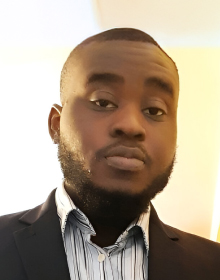Age against the machine
Judah Adeniyi studies how older workers adapt to technological change while also navigating uncertainty and growth in his own academic journey, showing that neither age nor experience is a barrier to progress.
Where are you from?
I was born and raised in Lagos, Nigeria. In 2016, I moved to Canada to pursue my master’s degree and lived in Ontario before relocating to St. John’s in 2019 to begin my PhD. Moving to St. John’s was a significant adjustment, as I had always lived in large cities. But I was quickly captivated by the city’s stunning topography and rich history. More importantly, I found an incredible community of friends and colleagues here, and now, I proudly call St. John’s home.
What do you enjoy doing for fun?
I enjoy activities that keep both my mind and body engaged. I love taking long walks, listening to music, reading, bowling and working out. Doing these activities help me recharge and bring balance to my busy academic life.
Why did you decide to pursue a graduate degree?
My decision to pursue a graduate degree was driven by a deep curiosity and a genuine thirst for knowledge. I’ve always considered myself a lifelong learner, and graduate studies offered the opportunity to explore complex ideas, challenge myself intellectually and contribute meaningfully to the world through research.
Why did you choose Memorial University for your graduate studies?
I chose Memorial University because it offered a unique opportunity to learn from and collaborate with renowned researchers and academics in my field of study. The university’s strong research culture, supportive environment and commitment to academic excellence made it an ideal place to grow both intellectually and professionally. The affordable tuition was also a bonus!
What is your research/thesis about? How do you describe your research to a general audience with no background in the field?
My thesis looks at how technology is changing the way we work, especially for older workers. As new technologies continue to reshape industries, there’s a lot of uncertainty around how people adapt, stay motivated, and decide whether to keep working or retire early. I explore how this uncertainty affects things like burnout, job satisfaction and people’s overall commitment to their careers. My goal is to better understand how organizations can support workers, particularly older ones, during times of rapid technological change, so that no one is left behind in the future of work.
How would you describe your experience as a graduate student at Memorial?
My experience at Memorial has been nothing short of remarkable. It hasn’t been without its challenges, but each one has pushed me to grow, both personally and professionally. I have been fortunate to meet incredible friends, colleagues and mentors who have supported and guided me through this journey. I can say with confidence that I’m leaving this institution as a stronger, more well-rounded version of myself than when I first arrived.
What scholarships or awards have you received?
I’ve been fortunate to receive several scholarships and awards during my time at Memorial University. Some of the key ones include:
Aging Research Centre – Newfoundland and Labrador (ARC-NL) Graduate Fellowship (2024)
BMO Financial Group Graduate Scholarship in the Faculty of Business Administration (2021–2025)
Memorial University Graduate Student Travel Funding (2023 & 2024)
Office of Public Engagement Quick Start Fund, Memorial University (2022)
Joe O'Neil Memorial Award (2021)
These awards have not only supported my academic journey but have also encouraged me to stay engaged with research, community outreach and scholarly development.
Have you faced any challenges in life that you’ve overcome to pursue graduate studies?
Like many international students, I’ve faced my fair share of challenges: navigating a new country, adjusting to a different academic system and being far from family and familiar support networks. There were moments of financial uncertainty, cultural adjustment and self-doubt. But each challenge also became a catalyst for growth. I developed and leaned on the strong community around me and stayed focused on my goals and purpose. Those experiences have shaped not just my academic journey, but also the kind of scholar and person I’ve become.
What career path are you interested in pursuing after graduation?
After graduation, I’m excited to pursue a career in academia, where I can continue my research and also teach and mentor the next generation of leaders. I’m particularly passionate about research that addresses real-world workforce challenges and bridges the gap between theory and practice. My goal is to contribute to a more inclusive, future-ready world of work, both through scholarship and through meaningful engagement with students, organizations and communities.
What advice would you give to current or future graduate students?
Graduate school is a journey, sometimes exciting, sometimes challenging, but always transformative. In the end, you may find that you value the journey even more than the degree itself. My advice is to stay curious, be kind to yourself and don’t be afraid to ask for help. Surround yourself with people who support and uplift you and remember that growth often happens in the difficult moments. Most importantly, stay connected to your “why”—the reason you started this journey in the first place. It will ground you when things get tough and remind you that you belong here.
Become a graduate student at Memorial. Apply online today!
